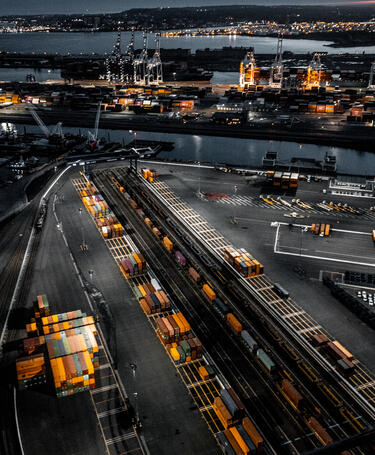
Global supply chains: trust and transparency
Progress indicator

Action on climate commitments has never been more critical and an approach focused on delivering data-driven ESG objectives is not only a crucial framework for adhering to climate regulations but is the new standard of risk management, says Heather Moore, Supply Chain Sustainability Technical Director at LRQA.
ESG commitments are growing in significance to ensure practices do not have a detrimental impact. Last year’s Conference of the Parties to the United Nations Framework Convention on Climate Change (COP27) taught us the importance of trust and transparency and further scrutiny of supply chains is anticipated. When commitments are made, it is essential they are backed up with evidence – otherwise, brands could face backlash for ‘greenwashing.’
From the Covid-19 pandemic to climate change, it is increasingly apparent that some challenges transcend the abilities of a single institution. Measuring ESG success is one such area. We have seen a shift, with organisations taking responsibility for their own impact, along with that of their supply chain. It is this collaborative approach that brings change. And while regulation and legislation set the basic standards, it is the proactivity of businesses – beyond compliance – that could make a significant difference.
Prioritising transparency
It is not just the quality profession that is responsible for implementing processes and defining success in terms of compliance, risk and sustainability management – all departments have a key role to play in delivering transparency on ESG progress.
Measurement of the right ESG metrics is crucial to leverage the value of data, which should be made readily available to build trust for all stakeholders. From waste management to wage underpayment and tax transparency, data visibility provides assurance that all parties along the supply chain are delivering on objectives. Without it, it is more difficult to identify risk.
As the focus shifts towards the validity of environmental and social claims, accountability is critical. Verification of data is increasingly being regarded as an essential tool for supply chain visibility. To achieve complete transparency, organisations must ensure their data is checked and verified independently by a third party.
Reflecting regulations
The focus on third-party verification is mirrored in governmental policy and regulation on a global scale. Most notably, the EU’s Corporate Sustainability Reporting Directive (CSRD) seeks to improve reporting, moving the European single market towards a more aligned process. From 1 January 2024, the first cohort must start data collection. With this in mind, it is of the utmost importance that quality managers understand how the directive will affect their business and supply chain.
“Measurement of the right ESG metrics is crucial to leverage the value of data, which should be made readily available to build trust for all stakeholders.”
Ensuring progress is monitored and communicated is also key. One of the challenges facing the organisers of COP28 will be how the phasing down of fossil fuels is actually measured. When making pledges or informing ESG policies, it is necessary to provide your organisation’s strategy on how your targets will be achieved. Not only will communicating the details of your strategy mitigate risk, but it can also help organisations stay on track to hit their targets.
Focus on supply chains
Extending ESG performance work to the global supply chain adds many layers of complexity to organisational management. Though it is easier to manage ESG objectives in your own facility or building and under your own operation, ESG performance needs to be seen beyond internal management.
To endorse a code of conduct with issues such as carbon reduction or ethical performance, and then to perform due diligence, organisations need to find ways to embed ESG into their extended supply chains. ESG-related penalties and rewards can be used within the procurement process to inform companies and stakeholders of an organisation’s commitment to supply chain initiatives. Through publishing audit reports into the public sphere, many organisations have shown a willingness to be transparent about their supply chain activity.
As reputations are now increasingly at stake for brands involved in unsustainable practice or human rights infringements, the approach to compliance has shifted from an annual ‘moment in time’ check to a year-round, risk-based monitoring and mitigation programme, reaching beyond compliance. To ensure organisations are building capacity for responsible practices into their supply chain, this deeper level of engagement is a necessity.
Parting thoughts
At the turn of the century, conversations about ESG centred on ‘issues’ and ‘factors’ – today it has evolved to focusing on ‘metrics’ and ‘performance’. Gone are the days where ESG was a way to differentiate from competitors; it is now a hallmark of efficient global operation. With the COP27 conference aiming to renew solidarity between countries, organisations operating a global supply chain must take ownership and assure all links of their supply chain.
Find out about the concept of a sustainability conscience.
Become a member
Take your quality career to the next level by becoming a member of the CQI or an IRCA Certificated Auditor.